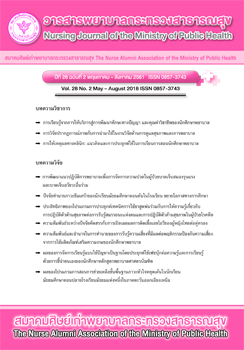Effectiveness of a Program of Inhaler Application with Knowledge Related to Health Behavior on Perceived Self-Efficacy and Health Behavior in Patients with Asthma
Main Article Content
Abstract
Abstract
This quasi-experimental research study aimed to investigate the effects of a program of inhaler application with knowledge related to health behavior on Perceived Self-Efficacy and health behavior in patients with asthma. A purposive sampling technique was used to recruit of 56 patients diagnosed with asthma from an out-patient clinic of a primary care unit in Bangkok. The sample was divided into two groups. The experimental group consisted of 28 asthma patients while the control group consisted of another 28 patients. The experimental group received the program of inhaler application along with knowledge related to perceived self-efficacy and health behavior while the control group received the usual care for asthma. The questionnaire consisted of demographic information, self-efficacy scale or SES (CVI=.8; alpha=.85) for asthma, and health practice scale or HPS (CVI=.9; alpha=.88). The data were obtained during three phases, including before receiving the program, immediately after finishing the program, and 4 weeks after completion of the program. The data were analysed using descriptive statistics, Chi-square, One-way repeated measure ANOVA, and independent-t test.
The results showed that the average scores of SES and HPS in the experimental group were significantly higher than those of the control group when receiving the program immediately after completion, and 4 weeks after completion (p<.01). The average scores of SES and HPS in the experimental group when receiving the program immediately after completion and 4 weeks after completion, were significantly higher than those of the group before receiving the program (p<.01). This study suggests that nurses should promote and apply SES and HPS program in order to assist patients in achieving a good quality of life. This sutudy suggests that nurses should promote this programe to assist patients with appropriate health behaviors . As a result, good asthma control.
Article Details
บทความและรายงานวิจัยในวารสารพยาบาลกระทรวงสาธารณสุข เป็นความคิดเห็นของ ผู้เขียน มิใช่ของคณะผู้จัดทำ และมิใช่ความรับผิดชอบของสมาคมศิษย์เก่าพยาบาลกระทรวงสาธารณสุข ซึ่งสามารถนำไปอ้างอิงได้
References
1. Thai Asthma Council and Association. Guidelines for diagnosis and treatment of asthma in adults, Thailand 2017 [internet]. 2017[cited 2017 Dec 20]. [Available from:http://www.tac.or.th/web/images guide lines/Asthma-Guideline_2560.pdf
2. Global Initiative for Asthma. Global strategy for asthm management and prevention [internet]. 2018[cited 2018 Jan 15]. Available from: http://ginasthma.org/2018-gina-report-global-strategy-for-asthma-management-and-prevention/
3. Sanchis J, Gich I, Pedersen S. Systematic review of errors in inhaler use: has patient technique improved over time? Chest. 2016;150(2):394-406.
4. Capanoglu M, Dibek Misirlioglu E, Toyran M, Civelek E, Kocabas CN. Evaluation of inhaler technique, adherence to therapy and their effect on disease control among children with asthma using metered dose or dry powder inhalers.JAsthma. 2015;52(8):838-45.
5. Miles C, Arden-Close E, Thomas M, Burton A, Yardley L, Hankins M, et al. Barriers and facilittors of effective self- management in asthma: systematic review and thematic synthesis of patient and health care professional views. NPJ Prim Care Respir Med. 2017;27(57):1-21 doi : 10.1038/s41533-017-0056-4.
6. Thamkampee K, Joothong S, Jourjamsai N, Roonsrithong N, Chalermchai N, Lawthong C. Treatment for asthma patients in hospitals affiliated with the Ministry of Public Health. Thai J Tuberc Chest Dis Crit Care. 08;26(4):235-42. (inThai).
7. AI-Jahdali H, Ahmed A, Al-Harbi A, Khan M, Baharoon S, Bin Salih S, et al. Improper inhaler technique is associated with poor asthma control and frequentemer gency department visits. Allergy Asthma Clin Immunol. 2013;9(1):8 doi : 10.1186/710-492-9-8.
8. Garcia-Cardenas V, Sabater-Hernandes D, Garcia-Corpas J, Faus MJ, Martinez-Martinez F, Benrimoj SI. Error in turbuhaler technique in a Spanish population of asthmatic patients. Respir care.2012;57(5):817-19 doi: 10.4187/respcare.01757.
9. Berg J, Dunbar-Jacob J, Sereika M. An evaluation of a self-management program for adult with asthma. Clin Nurs Res. 2008;6(3):225-38.
10. Geyser M, Rheeder P. Risk factors precipitating exacerbations in adult asthma patients presenting at kalafong Hospital, Pretoria. S Afr Fam Pract. 2008;50(4):67-67e.
11. Photaworn T. The effects of health teaching on health practices and quality of life of patients with asthma [Thesis]. Songkla: Prince of Songkla University; 2006. (in Thai).
12. Bandura A. Self-efficacy: The exercise of control. New York, NY: Worth Publishers; 1997.
13. Cohen J. Statistical power analysis for the behavioral sciences. 2nd ed. Hillsdale, NJ: Lawrence; 1988.
14. Pilchta SB, Kelvin EA. Munro’s statistical methods for health care research. 6th ed. China: Wolters Kluwer Health/Lippincott Wiliams & Wilkins;2013.
15. Pimkhot N, Suebsoh W, Teewunda D. Effect of perceived self-efficacy and social support on behavior modification of asthma patients [Thesis]. Mahasarakam: Mahasarakam University; 2013. (in Thai).
16. Suwannachart W. The effect of perceived self- efficacy promoting program on self management behavior in asthmatic adult patients [Thesis]. Bangkok: Chulalong korn University; 2016. (in Thai).
17. Namcharoen T. Effect of using a comic book as a teaching medium for breathing exercise and inhalation practice on asthma control in school-aged children [Thesis]. Songkla: Prince of Songkla University; 2011. (in Thai).

